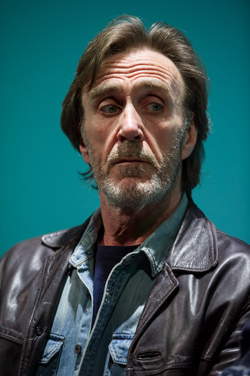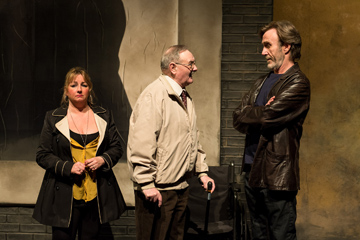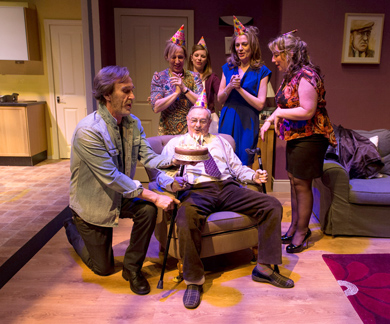 An excellent performance. Billy Martin played by Joe McGann.[/caption]
Acclaimed playwright Graham Reid, speaking at a talk prior to the showing of the play, said: “The original Billy performances on BBC TV made in the Balmoral studios were very much close up tight shots on low budget interior sets. What ‘Love, Billy’ presents is a different approach as this is now in the theatre. On TV the camera could zoom in to focus on the subtle expressions of the characters but in any theatre after the first five rows you would lose this effect.
“But I can remember when we were shooting the original plays with Jimmy Ellis. He would make a number of great suggestions and did help to shape the final outcome of the performances quite often.”
Also speaking at the talk, Director Roy Heayberd said that ‘Love, Billy’ received the first standing ovation at a preview ever and the cast were delighted by this. In describing the set, he said: “In contrast with the early days of the Billy plays, this set is very contemporary and mobile and dynamic and describes the more better off and modern life of the Martin family.”
The play begins with the haunting lyrics of the old folk tune Black Velvet Band immediately touching on the theme of separation. The main character Billy Martin had reappeared in Belfast from England after 25 years and his family are waiting for him. As the play unfolds, questions are asked why he left in the first place. During the Troubles many left the city. And as the family contemplate Billy’s late arrival, a sense of dislocation emerges of a person now far removed from the family.
[caption id="attachment_38538" align="alignright" width="360"]
An excellent performance. Billy Martin played by Joe McGann.[/caption]
Acclaimed playwright Graham Reid, speaking at a talk prior to the showing of the play, said: “The original Billy performances on BBC TV made in the Balmoral studios were very much close up tight shots on low budget interior sets. What ‘Love, Billy’ presents is a different approach as this is now in the theatre. On TV the camera could zoom in to focus on the subtle expressions of the characters but in any theatre after the first five rows you would lose this effect.
“But I can remember when we were shooting the original plays with Jimmy Ellis. He would make a number of great suggestions and did help to shape the final outcome of the performances quite often.”
Also speaking at the talk, Director Roy Heayberd said that ‘Love, Billy’ received the first standing ovation at a preview ever and the cast were delighted by this. In describing the set, he said: “In contrast with the early days of the Billy plays, this set is very contemporary and mobile and dynamic and describes the more better off and modern life of the Martin family.”
The play begins with the haunting lyrics of the old folk tune Black Velvet Band immediately touching on the theme of separation. The main character Billy Martin had reappeared in Belfast from England after 25 years and his family are waiting for him. As the play unfolds, questions are asked why he left in the first place. During the Troubles many left the city. And as the family contemplate Billy’s late arrival, a sense of dislocation emerges of a person now far removed from the family.
[caption id="attachment_38538" align="alignright" width="360"] Norman Martin confronts his son Billy.[/caption]
Billy’s father Norman, a dominant figure in the household, is not impressed by him arriving in the morning and not calling up to the family home. Billy choses to walk around his old haunts instead arriving late in the evening. Much of his own area has been re-developed and a sense of social alienation emerges where people are apart from the surroundings they were familiar with. Social identity is touched on. The Martin family is touched alcohol problems, a sense of disappointment in their own being, and there is a backcloth of violence in the family.
Gradually Billy’s past emerges – he had been in the Royal Marines for nine years and had served in Northern Ireland in two special ops tours, one of which involved a deadly shootout with RUC officers. His own sister Lorna, retired policewoman, was still grieving over the death of her husband Michael who was shot dead.
Much is made by Norman of Billy leaving his home without apparent reason, but in a clever counterpoint, Billy points out that Norman had never visited visited his sick mother who was dying in hospital, something Norman tries to justify. But for Billy it was one straw too many breaking the camel’s back and he left Belfast to become a lorry driver and travel across Europe. Some thought he had joined the Foreign Legion.
[caption id="attachment_38539" align="alignleft" width="390"]
Norman Martin confronts his son Billy.[/caption]
Billy’s father Norman, a dominant figure in the household, is not impressed by him arriving in the morning and not calling up to the family home. Billy choses to walk around his old haunts instead arriving late in the evening. Much of his own area has been re-developed and a sense of social alienation emerges where people are apart from the surroundings they were familiar with. Social identity is touched on. The Martin family is touched alcohol problems, a sense of disappointment in their own being, and there is a backcloth of violence in the family.
Gradually Billy’s past emerges – he had been in the Royal Marines for nine years and had served in Northern Ireland in two special ops tours, one of which involved a deadly shootout with RUC officers. His own sister Lorna, retired policewoman, was still grieving over the death of her husband Michael who was shot dead.
Much is made by Norman of Billy leaving his home without apparent reason, but in a clever counterpoint, Billy points out that Norman had never visited visited his sick mother who was dying in hospital, something Norman tries to justify. But for Billy it was one straw too many breaking the camel’s back and he left Belfast to become a lorry driver and travel across Europe. Some thought he had joined the Foreign Legion.
[caption id="attachment_38539" align="alignleft" width="390"] The Martin family celebrate Norman’s 73rd birthday.[/caption]
The air of mystery cloaks Billy through the play and Norman his father is confrontational from the onset. This relationship is typical of many son-father relationships and the audience almost feel a sense of rebirth in the relationship when it’s time to celebrate Norman’s 73 birthday as the family rally round but alas be takes seriously ill and collapses and is rushed off to the the City hospital. The play ends with a reconciliation between Billy and Norman, but the final scene is one of tragedy as Norman suddenly dies. Billy touchingly hugs his father in death.
All of Billy’s sisters had different issues with him through the play and this inter-personal action reflects what modern family life is about in working class Belfast.
In the end we are left with a main character who has battled against a claustrophobic social family setting, a society in conflict, and he left to sort out his own personal demons. His return after 25 years was a journey he had to make.
‘Love, Billy’ is a very enjoyable comment about a Belfast family who have come through a period of social and political change, and Graham Reid, writing from his own personal experiences, has delivered a poignant play of what life is about today in a city that still is still adjusting in the post-Troubles era.
This was an excellent performance by all of the cast and Billy Martin played by Joe McGann was excellent, wearing his cloak of mystery well. His father Norman played by George Shane was also a strong well-played character that many could identify with. The comic character of Ernie Greer aka Ciaran Nolan helped to introduce Billy to the audience, and the family members played by Ger Ryan, Sarah Lyle, Tracey Lynch and Maggie Hayes was also on top form on the night.
As the play began with haunting lyrics of the Black Velvet Band, it ended in this way creating a balance – and echoing the themes of separation, loss, grief, and pain.
Belfast Telegraph critic Keith Baker wrote in the Programme Note referring the the original Billy play in 1982: “It was a strange time to schedule a drama from Northern Ireland that wasn’t about the Troubles. But maybe that was part of its attraction.”
‘Love, Billy’ is part of the Belfast quartet of plays being run by the Lyric theatre to celebrate the 400th anniversary of the city.
www.lyrictheatre.co.uk]]>
The Martin family celebrate Norman’s 73rd birthday.[/caption]
The air of mystery cloaks Billy through the play and Norman his father is confrontational from the onset. This relationship is typical of many son-father relationships and the audience almost feel a sense of rebirth in the relationship when it’s time to celebrate Norman’s 73 birthday as the family rally round but alas be takes seriously ill and collapses and is rushed off to the the City hospital. The play ends with a reconciliation between Billy and Norman, but the final scene is one of tragedy as Norman suddenly dies. Billy touchingly hugs his father in death.
All of Billy’s sisters had different issues with him through the play and this inter-personal action reflects what modern family life is about in working class Belfast.
In the end we are left with a main character who has battled against a claustrophobic social family setting, a society in conflict, and he left to sort out his own personal demons. His return after 25 years was a journey he had to make.
‘Love, Billy’ is a very enjoyable comment about a Belfast family who have come through a period of social and political change, and Graham Reid, writing from his own personal experiences, has delivered a poignant play of what life is about today in a city that still is still adjusting in the post-Troubles era.
This was an excellent performance by all of the cast and Billy Martin played by Joe McGann was excellent, wearing his cloak of mystery well. His father Norman played by George Shane was also a strong well-played character that many could identify with. The comic character of Ernie Greer aka Ciaran Nolan helped to introduce Billy to the audience, and the family members played by Ger Ryan, Sarah Lyle, Tracey Lynch and Maggie Hayes was also on top form on the night.
As the play began with haunting lyrics of the Black Velvet Band, it ended in this way creating a balance – and echoing the themes of separation, loss, grief, and pain.
Belfast Telegraph critic Keith Baker wrote in the Programme Note referring the the original Billy play in 1982: “It was a strange time to schedule a drama from Northern Ireland that wasn’t about the Troubles. But maybe that was part of its attraction.”
‘Love, Billy’ is part of the Belfast quartet of plays being run by the Lyric theatre to celebrate the 400th anniversary of the city.
www.lyrictheatre.co.uk]]>
























